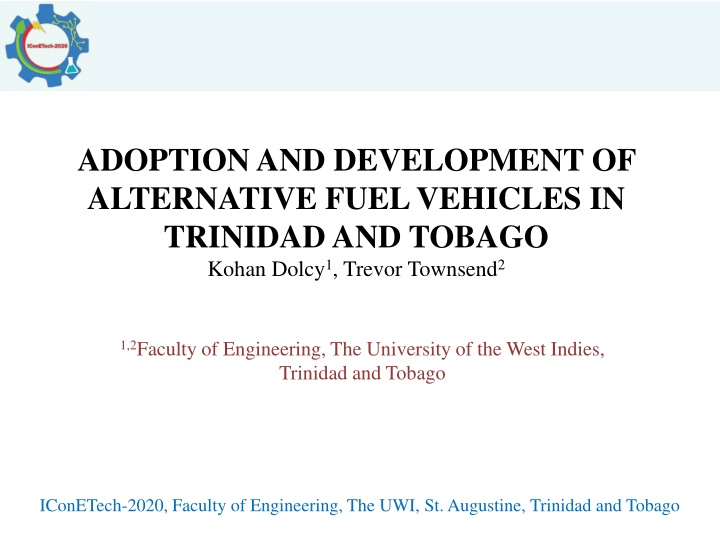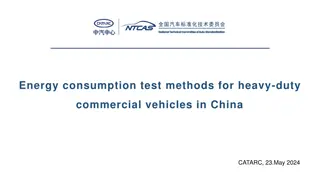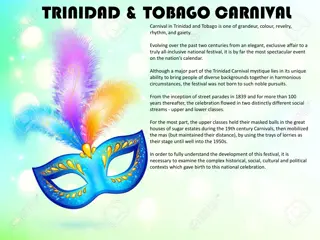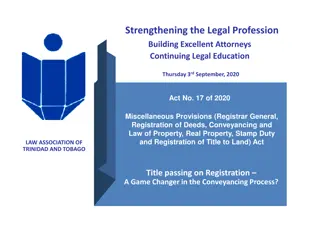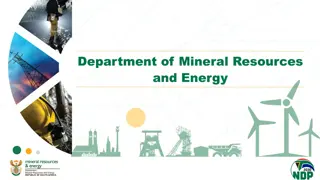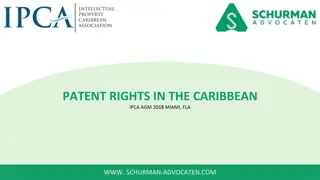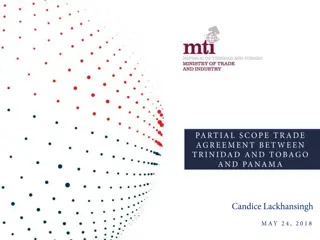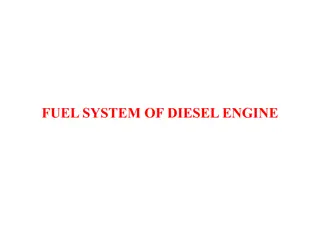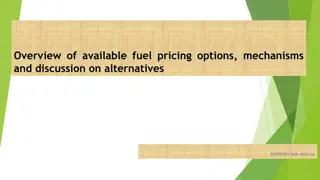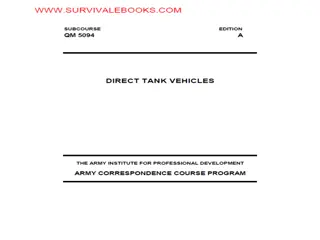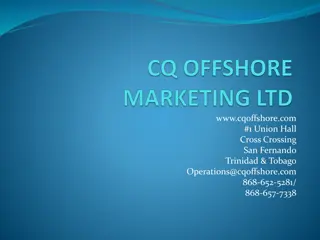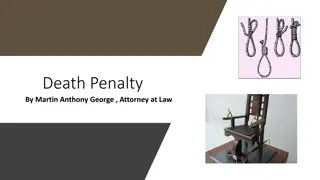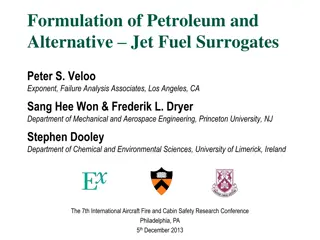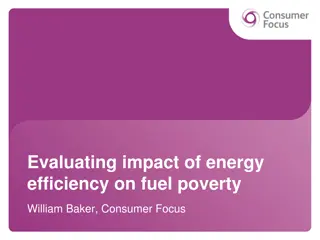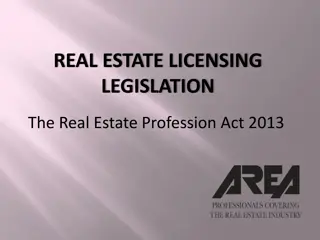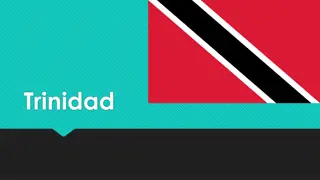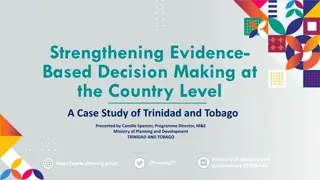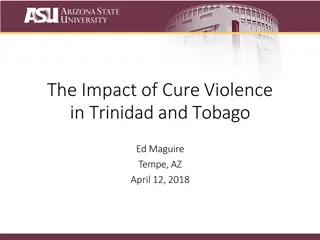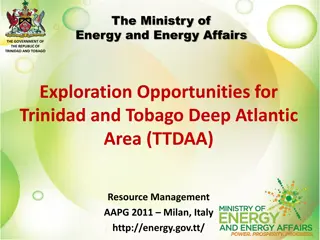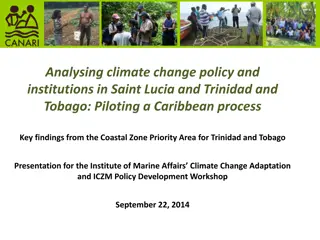Alternative Fuel Vehicles in Trinidad and Tobago
Adoption and development of alternative fuel vehicles in Trinidad and Tobago are discussed in this study, focusing on the current situation, objectives, approach, and recommendations to improve sustainability in the road transportation system. Insights into the transportation system, AFV technology, and local discourse issues are provided to understand the challenges and opportunities in transitioning to more eco-friendly vehicles.
Download Presentation

Please find below an Image/Link to download the presentation.
The content on the website is provided AS IS for your information and personal use only. It may not be sold, licensed, or shared on other websites without obtaining consent from the author.If you encounter any issues during the download, it is possible that the publisher has removed the file from their server.
You are allowed to download the files provided on this website for personal or commercial use, subject to the condition that they are used lawfully. All files are the property of their respective owners.
The content on the website is provided AS IS for your information and personal use only. It may not be sold, licensed, or shared on other websites without obtaining consent from the author.
E N D
Presentation Transcript
ADOPTION AND DEVELOPMENT OF ALTERNATIVE FUEL VEHICLES IN TRINIDAD AND TOBAGO Kohan Dolcy1, Trevor Townsend2 1,2Faculty of Engineering, The University of the West Indies, Trinidad and Tobago IConETech-2020, Faculty of Engineering, The UWI, St. Augustine, Trinidad and Tobago
PRESENTATION OUTLINE OBJECTIVES APPROACH SIDS & ROAD TRANSPORT AFV ORIENTED POLICY AFV ADOPTION, PROGRESS & PROJECTIONS SUMMARY/ INFERENCES RECOMMENDATIONS CONCLUSION IConETech-2020, Faculty of Engineering, The UWI, St. Augustine, Trinidad and Tobago
OBJECTIVES Perform an overview of the Trinidad and Tobago transportation system Explore the current situation with the development and adoption of AFV technology in Trinidad and Tobago; Provide recommendations for the increased integration of AFVs to improve the sustainability of the road transportation system. IConETech-2020, Faculty of Engineering, The UWI, St. Augustine, Trinidad and Tobago
APPROACH Problem identification; Sourcing and verification of data; Semi-structured interviews. Desktop review; Policy documents; Stakeholder incentives. Situational analysis; Inferences; Recommendations. IConETech-2020, Faculty of Engineering, The UWI, St. Augustine, Trinidad and Tobago
SIDS & ROAD TRANSPORT Table 1. Comparison of transportation systems in Trinidad compared to other SIDS ASPECT Resources Transportation System Main road network TRINIDAD & TOBAGO Oil and gas reserves Larger, multiple transport modes Network of highways and arterials (Classes A to C) EW and NS corridors; taxis to supplement At least 4 fuel options, relatively cheap fuel Present but not prevalent OTHER SIDS Scarce resources Smaller, basic transport modes Mostly Class B-D roads PT Routes Major towns and cities; along main road Limited fuel options, costly fuel Present but not prevalent High GHG emissions Fuel availability AFV presence Environmental effects High GHG emissions IConETech-2020, Faculty of Engineering, The UWI, St. Augustine, Trinidad and Tobago
LOCAL TRANSPORTATION DISCOURSE ISSUES Prioritization of short and long term traffic and transportation plans [1]; Established requirements for sustainable transportation [2]; Sensitization on and high priority towards electric vehicles; Private sector involvement [2]; Sustainable funding user targeted subsidies [2]. Heavily subsidized fuel prices; Availability of alternative fuels; Vehicle population; Accessibility of AFVs. SOLUTIONS Figure 1. Issues within and solutions proposed for the local transport system IConETech-2020, Faculty of Engineering, The UWI, St. Augustine, Trinidad and Tobago
PUBLIC TRANSPORTATION IN T&T Table 2. AFV share in public transportation system in Trinidad and Tobago No. of Vehicles 315 [3] Public Transport Entity PTSC % of AFVs per mode ~ 20 Estimated Annual Ridership 12.6 million (2010) 7.6 million (2014) 70%-80% transport trips [3] 275 million pass. trips AMTTT, AMTSTC, PSTATT, Other 5000+ ~ 2 of public Taxis (H plates) 13000+ ~ 5 TTRS, DROP, etc. PinkCab, unknown Source: Extracted from [4] from multiple local sources, including [2][3][5] IConETech-2020, Faculty of Engineering, The UWI, St. Augustine, Trinidad and Tobago
AFV ORIENTED POLICY 2015 RE targets; NDC; CNG Standard Waiver of import duties 2016 Restrictions on waiver of import duty 2017 Waiver of import duty ceases (selective) 2020 10% RE to be achieved 2021 15% reduction in overall emissions from BAU case of 2013 2030 Figure 2. Timeline of AFV related policy interventions [9] IConETech-2020, Faculty of Engineering, The UWI, St. Augustine, Trinidad and Tobago
AFV ADOPTION & DEVELOPMENT CNG Standards developed Waiver of VAT and MVT Mobile refuelling units Free CNG conversions CNG filling stations Training programs Maxi taxi grants Capital uplift Tax credits Figure 3. AFV initiatives undertaken by the GORTT to date IConETech-2020, Faculty of Engineering, The UWI, St. Augustine, Trinidad and Tobago
AFV PROGRESS & PROJECTIONS CNG Vehicle Conversion Progress and Projections 20000 17,500 No. of CNG Vehicle Conversions 15,122 15000 11,948 10000 8,774 5,300 5000 0 Bus Maxi-taxi Taxi Private car Total Vehicles by Type 2018 Target Current Status 100% 300% 500% Figure 4. CNG development as at mid-2019 vs NGC CNG 2018 target [4] IConETech-2020, Faculty of Engineering, The UWI, St. Augustine, Trinidad and Tobago
SUMMARY ACTION HINDRANCE Uptake not as successful as anticipated Reduced cargo space, perceived safety issues, insufficient infrastructure and other highly subsidized fuels Natural gas more viable than electricity as a vehicular fuel AFVs can play a subtle yet effective role in improving transportation sustainability GORTT has invested $$$ into CNG advancement Major impediments to CNG adoption exist Electricity from natural gas very efficient Underlying legislative, technical and social hindrances must be addressed IConETech-2020, Faculty of Engineering, The UWI, St. Augustine, Trinidad and Tobago
INFERENCES There is currently no single body responsible for the organisation, coordination and regulation of the public transport sector [3], nor the monitoring the effectiveness of the various programs and policies. Some barriers to AFV adoption have been overcome in Trinidad and Tobago but are still perceived to exist. Elimination will require a combination of increased education and awareness, behavioural change, policy and technological updates, along with continuous evaluation. Increasing the number of alternative fuel vehicles will merely increase the total vehicle population unless coupled with reduction measures such as early retirement of vehicles and stricter measures for roadworthiness. IConETech-2020, Faculty of Engineering, The UWI, St. Augustine, Trinidad and Tobago
RECOMMENDATIONS Data collection Renewable Energy Behavioural change Achieving Sustainable Transport with AFVs Political will Energy Efficiency HOV and clean vehicle priority Intracity transit Adequate PT services Figure 5. Recommendations to achieve sustainable transport with AFVs IConETech-2020, Faculty of Engineering, The UWI, St. Augustine, Trinidad and Tobago
CONCLUSION There is a need for more involvement of professionals in the management of the local transportation system! IConETech-2020, Faculty of Engineering, The UWI, St. Augustine, Trinidad and Tobago
REFERENCES [1] R. Furlonge, Our Transportation System is in Crisis, no. 74, October 2009. Accessed on: April 14, 2019 Available: http://www.lfsystemstt.com/assets/our_transportation_system_is_in_crisis_- _74.pdf [2] T. Townsend, "Key Issues in the Future Development of our Transportation System," in Joint Consultative Council (JCC) Seminar on Housing, Building Construction & Land Use in a Challenging Economy, Port of Spain, Trinidad and Tobago, 2016. [3] T. Townsend, "No Rapid Rail Does not mean No Mass Transit," in ICE Seminar: Transportation Engineering: Addressing the Challenges, St. Augustine, Trinidad and Tobago, 2017, UK: Institution of Civil Engineers (ICE). IConETech-2020, Faculty of Engineering, The UWI, St. Augustine, Trinidad and Tobago
REFERENCES [4] K. Dolcy, "Alternative Fuel Vehicles for the Sustainability of the Transportation System - A Study of Trinidad and Tobago," Master of Science in Civil Engineering, Department of Civil and Environmental Engineering, The University of the West Indies, 2019. [5] Trinidad and Tobago. AGD (Auditor General's Department), "Report of the Auditor General of the Republic of Trinidad and Tobago on a Special Audit of the Public Transport Service Corporation," AGD, Port of Spain, Trinidad and Tobago, 2016, Available: http://www.auditorgeneral.gov.tt/sites/default/files/FINAL%20- %20PTSC%20Report%20-%2029th%20June%202016.pdf IConETech-2020, Faculty of Engineering, The UWI, St. Augustine, Trinidad and Tobago
THANK YOU! IConETech-2020, Faculty of Engineering, The UWI, St. Augustine, Trinidad and Tobago
